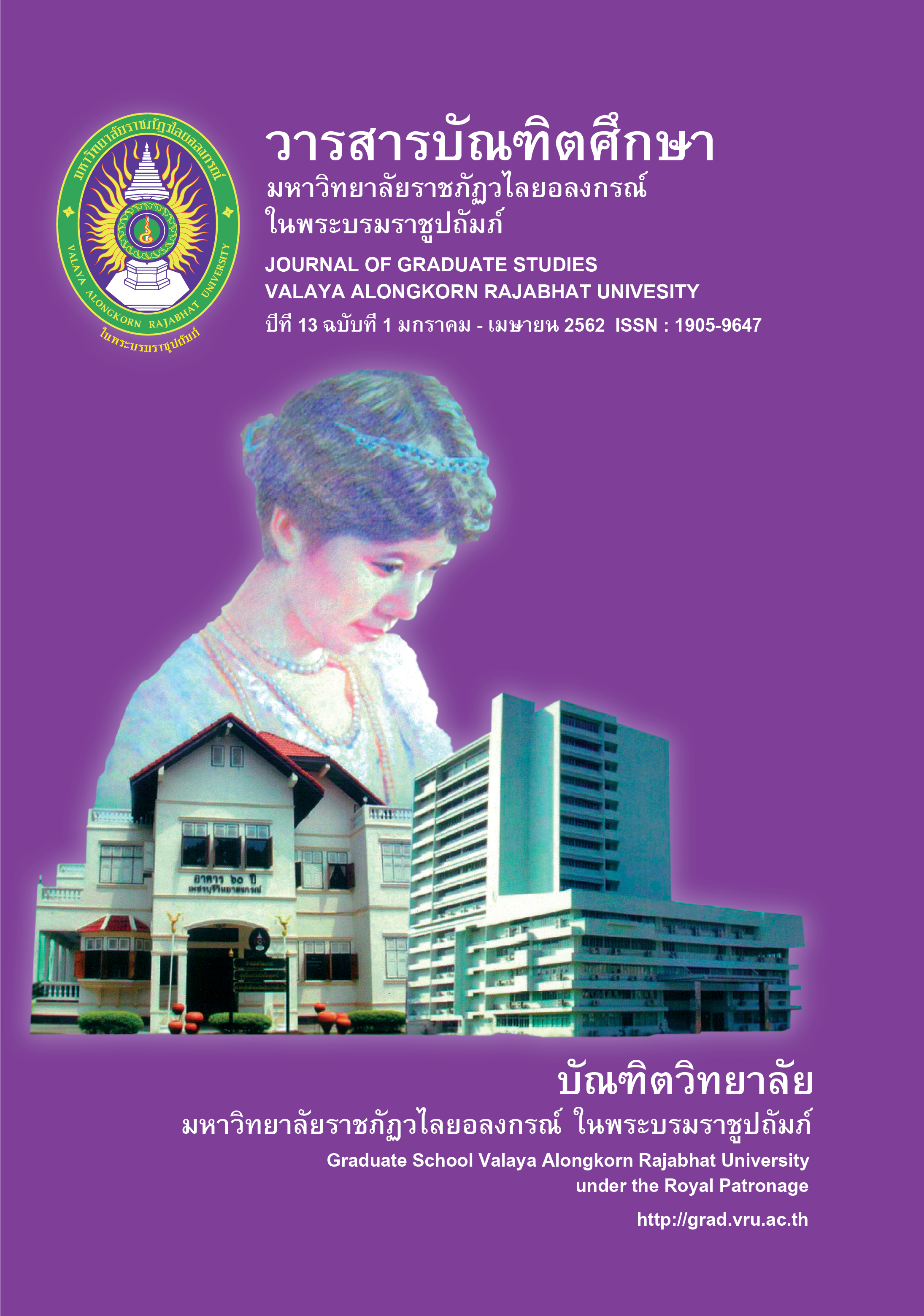A STUDY OF CHARACTERISTICS OF EDUCATIONAL SUCCESS IN 21ST CENTURY OF UNDERGRADUATE STUDENTS
Main Article Content
Abstract
The purpose of this research was to study meanings and characteristics of educational success in 21st century of undergraduate students by the use of the qualitative research. An educational expert interview was used to collect data. Interview forms with unstructured questions and semi-structured questions were used as the research instruments. The results revealed that (1) characteristics of educational success in 21st century of undergraduate students meant traits that indicating their educational success in 21st century. In other words, undergraduate students learn from the university curriculum and are able to apply these knowledge to their daily life and work effectively by explicitly understanding the key subjects, learning fast, and broadening themselves into the world of 21st century with all new information to be always occurred, and (2) characteristics of educational success in 21st century of undergraduate students were consisted of (a) Autonomous learning which were comprised of self-directed learning, knowledge of key subjects, knowledge of interdisciplinary themes, and supports from persons and social support, (b) Critical and creative thinking (c) Sociability, (d) ICT-Information and Communication Technology skill, (e) World language capability, (f) World Situation Awareness, and (g) Life and Career Capability which were comprised of Self-direction, Flexibility and Adaptability, Responsibility and Accountability, Leadership, and Integrity.
Article Details

This work is licensed under a Creative Commons Attribution-NonCommercial-NoDerivatives 4.0 International License.
บทความทุกเรื่องได้รับการตรวจความถูกต้องทางวิชาการโดยผู้ทรงคุณวุฒิ ทรรศนะและข้อคิดเห็นในบทความ Journal of Global of Perspectives in Humanities and Social Sciences (J-GPHSS) มิใช่เป็นทรรศนะและความคิดของผู้จัดทำจึงมิใช่ความรับผิดชอบของบัณฑิตวิทยาลัย มหาวิทยาลัยราชภัฏวไลยอลงกรณ์ ในพระบรมราชูปถัมภ์ กองบรรณาธิการไม่สงวนสิทธิ์การคัดลอก แต่ให้อ้างอิงแหล่งที่มา
References
Jenning, N. et al. (2013). What would make this a successful year for you? How students define success in college?. Liberal Education. Retrieved from https://www.aacu.org/publications-research/periodicals/what-would-make-successful-year-you-how-students-define-success.
Khopolklang, N. (2012). botkhwām rīaprīang čhāk kān banyāi phisēt rư̄ang kānphalit bandit nai satawat thī yīsipʻet dōi sāttrāčhān nāi phǣt wičhān Panich [Articles compiled from special lectures : Production of graduates in the 21st century by Prof. Vicharn Panich]. Suranaree Journal of Social Science. 6(2), 129-152.
Laohajaratsang, T. (2014). thaksa hǣng satawat thī yīsipʻet phư̄a kānphatthanā ʻāčhān khō̜ng mahāwitthayālai Chīang Mai [21st. Century skills for teacher development of Chiang Mai university]. Chiang Mai: Chiang Mai University.
Office of the Education Council. (2014). nǣothāng kānphatthanā kānsưksā Thai kap kāntē rī yom khwām phrō̜m sū satawat thī yīsipʻet: rāingān kānwičhai [Guideline for guidelines for the development of thai education with preparation for the 21st century: Research report]. Bangkok: Prikwarn graphic.
Office of the Education Council. (2017). krō̜p khunnawuthi hǣng chāt chabap prapprung [National qualifications framework (Thailand NQF) revised edition]. Bangkok: Prikwarn graphic.
Partnership for 21st Century Learning. (2007). Framework for 21st century learning. Retrieved from http://www.p21.org/storage/documents/docs/P21_framework_0816.pdf.
Tadawattanawit, S. (2018). khunnalaksana bandit thī sō̜tkhlō̜ng kap kānphatthanā prathēt Thai tām nǣo prathēt Thai 4.0 [The characteristics of the graduates in accordance with the development of Thailand according to the “Thailand 4.0” economic model]. Dusit Thani College Journal. 12(2), 404-416.
The Higher Education Commission. (2009). prakāt khana kammakān kān ʻudomsưksā rư̄ang nǣothāng kān patibat tām krō̜p māttrathān khunnawuthi radap ʻudomsưksā hǣng chāt [Notification of the higher education commission guidelines for compliance-with thai qualifications framework for higher education]. Bangkok.
Thongroj, P. (2014). WEF čhat ʻandap kānsưksā sō̜ngphansipsī - sō̜ngphansiphā Thai khunnaphāp tam tām kan Lāo Khamēn Wīatnām [WEF rated education 2014-2015 Thai low quality Laos, Cambodia, Vietnam]. Retrieved from https://blog.eduzones.com/magazine/133608.
Tohinda, K. (2013). kānsưksā phrưttikam kānchai bō̜rikān sōchīannetwœ̄k (Social Network ) khō̜ng naksưksā mahāwitthayālai Chīang Mai [A study on social network of students in Chiang Mai University]. Retrieved from library.cmu.ac.th/faculty/econ/Exer751409/2556/Exer2556_no8.
Tongkeo, T. (2008). kānbō̜rihān phư̄a mung khunnaphāp ʻudomsưksā Thai nai yuk sētthakit sērī [Administration to focus on thai higher education in the free economic era]. Retrieved from http://dusithost.dusit.ac.th/~ei/tuan/file21122005007.doc.
Trilling, B & Fadel, C. (2009). 21st Century skills learning for life in our times. San Francisco: John Wiley & Sons.


